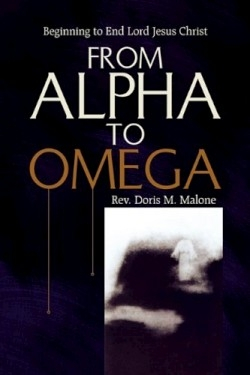From Alpha to Omega
Beginning to End Lord Jesus Christ
Abraham Lincoln is credited as saying, “[The Bible] is the best gift God has given to men. All the good Savior gave to the world was communicated through this Book.” Indeed, millions throughout history have shared Lincoln’s sentiment that studying the Bible is essential for a fulfilling human life.
In this tradition comes From Alpha to Omega. Author Doris M. Malone has been an ordained Christian minister for thirty-nine years, devoting the bulk of that time to prayer and Bible study.
Her devotion to the Bible and her relationship with God are certainly on display in this work. The book is organized based on the Bible, beginning with Malone’s thoughts about creation, progressing through Scripture, and ending with her interpretations of the book of Revelation and its implications for the End Times. Interspersed throughout are poems written by Malone, echoing the biblical topics described in each chapter.
Though Malone’s earnestness is obvious, her book is plagued by several fundamental problems. Firstly, Malone reprints copious portions of Scripture, punctuated, sometimes briefly, by her own thoughts. The biblical passages are very loosely taken from a combination of several Bible translations, with “some word clarifications.” Unfortunately, it is far from clear which words are Malone’s and which are present in a published Bible translation; further, which translation Malone is drawing from at any given time is very difficult to ascertain.
The accuracy of her reprints of these passages is suspect as well, since these texts, along with her own original thoughts, are rife with typographical errors. One example is her version of Genesis 2:15: “The Lord God took the man. Put [sic] him into the Garden of Eden…” Similar examples are found on every page, and in almost every paragraph.
Further, finding where the quoted Scripture ends and Malone’s thoughts begin is extremely challenging. There is no consistent formatting to help the reader through these transitions. Quoted passages tend to be bolded, but this convention is not consistently applied.
Malone’s original ideas are not always clearly explained, which adds to the reader’s confusion. In some places, they are too briefly stated. In others, they are simply puzzling, as when Malone describes Pentecost, writing, “Calling the people to repent and turn and follow Jesus Christ in obedience and His power.” Only after piecing together fragments from different paragraphs does the reader understand that Malone is describing the acts that Pentecost empowered the apostles to perform.
Given Malone’s clear dedication to her subject matter, it is regrettable that reading her book results in frustration and puzzlement, not inspiration or devotion. In order for this work to be understandable, it would need to be subjected to exhaustive revisions and very thorough editing.
Disclosure: This article is not an endorsement, but a review. The publisher of this book provided free copies of the book and paid a small fee to have their book reviewed by a professional reviewer. Foreword Reviews and Clarion Reviews make no guarantee that the publisher will receive a positive review. Foreword Magazine, Inc. is disclosing this in accordance with the Federal Trade Commission’s 16 CFR, Part 255.

